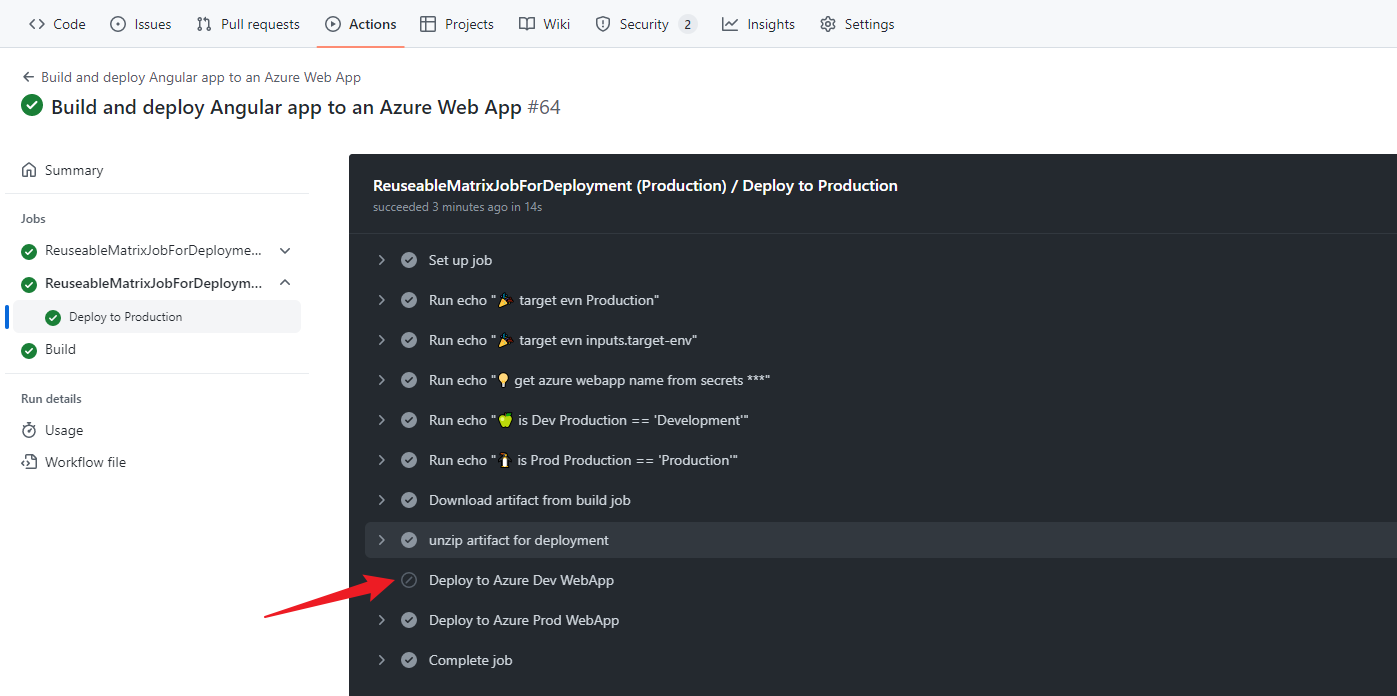This article is going to introduce:
- Deploy on multiple environment with GitHub Actons
- Add reviewers approve a workflow deploying
- Reuse workflow
Prerequisites
- Azure subscription, Resource Group and App Service
- Public GitHub repo
Deploy on multiple environment with GitHub Actons
In the previous article【Deploy to Azure with GitHub Actions】have introduced how to deploy web application to Azure App Service with GitHub Actions. Now what? In this article I am going to introduce how to deploy on multiple environment with GitHub Actions.
In our real projects, we usually need deploy on multiple environment, eg: Development Staging Production, actually this is quite simple, just add two more jobs in the YML file, once the build job is complete, deploy the artifacts to different environment(App Service).
Click here to see YML file 👇
name: Build and deploy Angular app to an Azure Web App
on:
push:
branches:
- master
workflow_dispatch:
inputs:
logLevel:
description: 'Log level'
required: true
default: 'warning'
type: choice
options:
- info
- warning
- debug
tags:
description: 'Test scenario tags'
required: false
type: boolean
environment:
description: 'Environment to run tests against'
type: environment
required: true
env:
AZURE_WEBAPP_NAME: my-app-name # set this to your application's name
AZURE_WEBAPP_PACKAGE_PATH: '.' # set this to the path to your web app project, defaults to the repository root
NODE_VERSION: '16.x' # set this to the node version to use
jobs:
build:
name: Build
runs-on: ubuntu-latest
steps:
- uses: actions/checkout@v3
- name: Use Node.js ${ { env.NODE_VERSION } }
uses: actions/setup-node@v3
with:
node-version: ${ { env.NODE_VERSION } }
cache: "npm"
cache-dependency-path: package-lock.json
- name: npm install, build, and test
run: |
npm install
npm run build --if-present
- name: Zip artifact for deployment
run: |
cd dist
zip release.zip ./* -r
- name: Upload artifact for deployment job
uses: actions/upload-artifact@v3
with:
name: node-app
path: ./dist/release.zip
deployDev:
name: Deploy to Dev
permissions:
contents: none
runs-on: ubuntu-latest
needs: build
environment:
name: "Development"
url: ${ { steps.deploy-to-webapp.outputs.webapp-url } }
steps:
- name: Download artifact from build job
uses: actions/download-artifact@v3
with:
name: node-app
- name: unzip artifact for deployment
run: unzip release.zip
- name: "Deploy to Azure WebApp"
id: deploy-to-webapp
uses: azure/webapps-deploy@v2
with:
app-name: ${ { secrets.AZURE_WEBAPP_SERVICE_NAME } }
slot-name: "production"
publish-profile: ${ { secrets.AZURE_WEBAPP_PUBLISH_PROFILE } }
package: ${ { env.AZURE_WEBAPP_PACKAGE_PATH } }
deployProd:
name: Deploy to Production
permissions:
contents: none
runs-on: ubuntu-latest
needs: deployDev
environment:
name: "Production"
url: ${ { steps.deploy-to-webapp-prod.outputs.webapp-url } }
steps:
- name: Download artifact from build job
uses: actions/download-artifact@v3
with:
name: node-app
- name: unzip artifact for deployment
run: unzip release.zip
- name: "Deploy to Azure WebApp"
id: deploy-to-webapp-prod
uses: azure/webapps-deploy@v2
with:
app-name: ${ { secrets.AZURE_WEBAPP_SERVICE_NAME_PROD } }
slot-name: "production"
publish-profile: ${ { secrets.AZURE_WEBAPP_PUBLISH_PROFILE_PROD } }
package: ${ { env.AZURE_WEBAPP_PACKAGE_PATH } }
Checkin this change into master, and you can see the workflow deploy to Development Production:
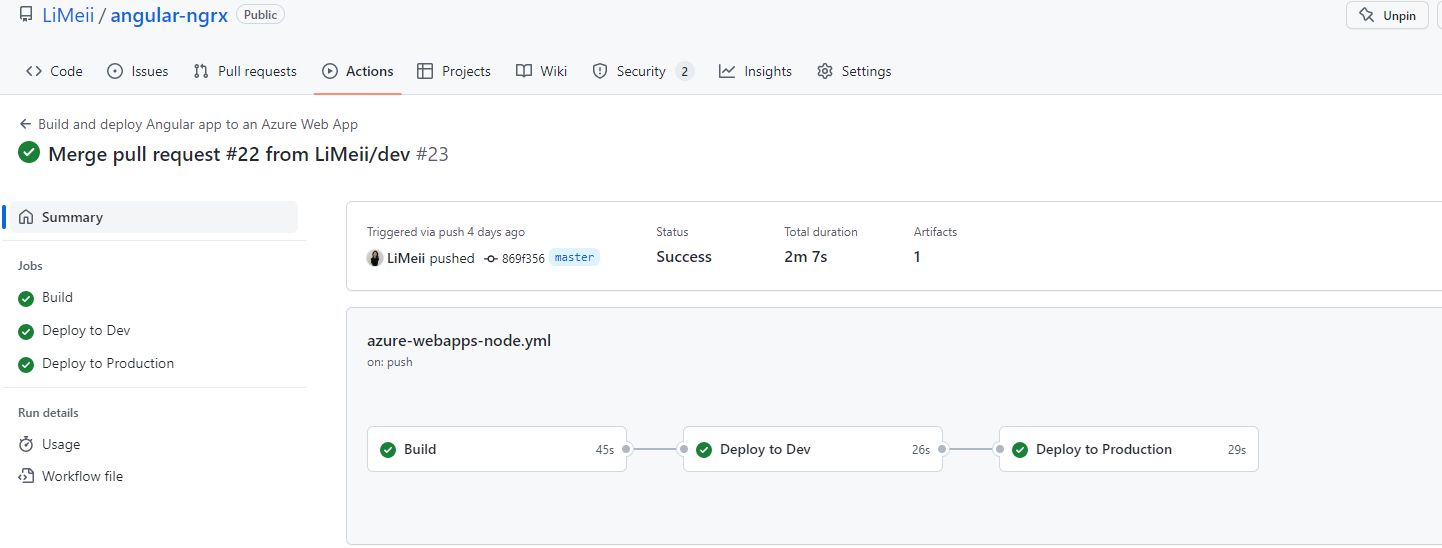
We also can see the manual trigger, can choose different environment:
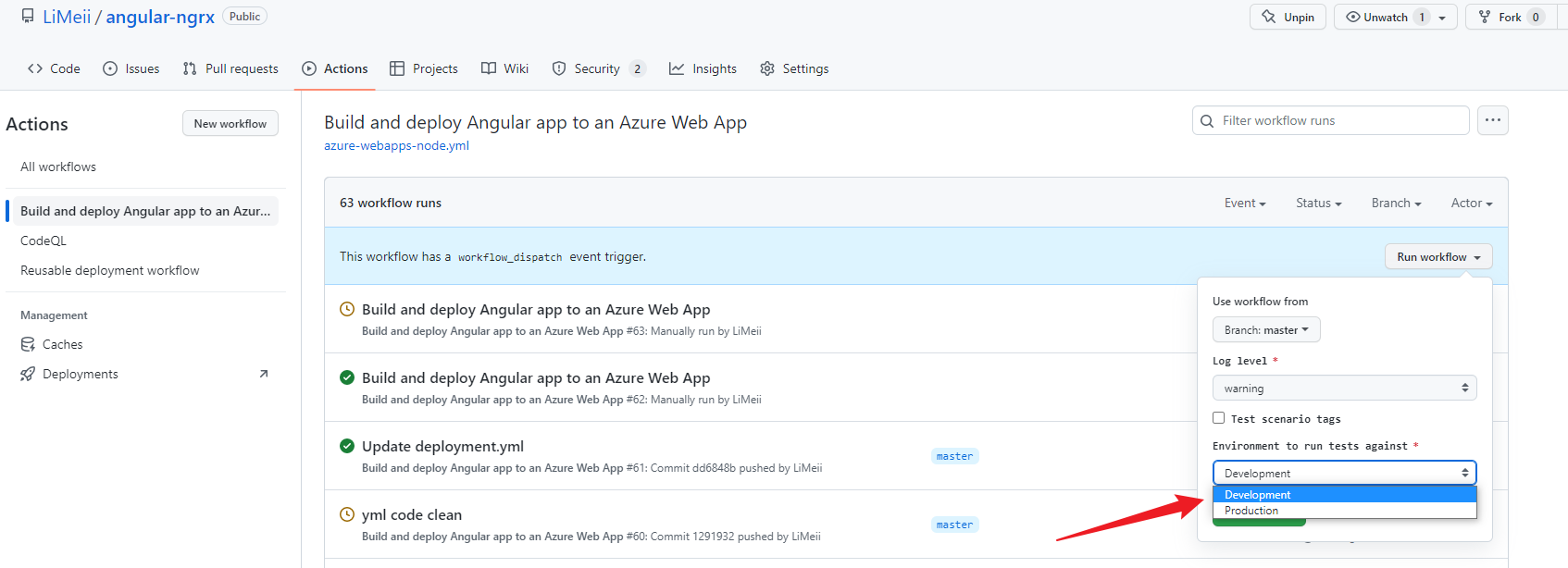
Add reviewers approve a workflow deploying
By following the steps above, you may notice that every time we checkin code into master, workflow triggered, and this will automatically deploy to both Devlopment and Production.
Generally, we don’t deploy every checkin to Production, we may need to complete a few features and test them in Development or Staging, if there are no issues, then we deploy to Production.
There two ways can achieve this:
-
Create two different worflow: one is for
Development, in this workflow YML file, listen to push code to master branch, every checkin to master, trigger this workflow deploy toDevelopment; the other one is forProduction, in this workflow YML file, listern to push code to release branch, every checkin to release, trigger this workflow deploy toProduction -
Use the same YML file with above, in the workflow listen to push code to master barnch, but we need to add reviewers for Production job, that means every checkin to master, it will automatically tirgger workflow build and deploy to
Development, but need reviewer to approve production deploying.
In this article, I use the second solution, add reviewers approve a workflow deploying. Go to the GitHub repo settings, add one new environment: Production
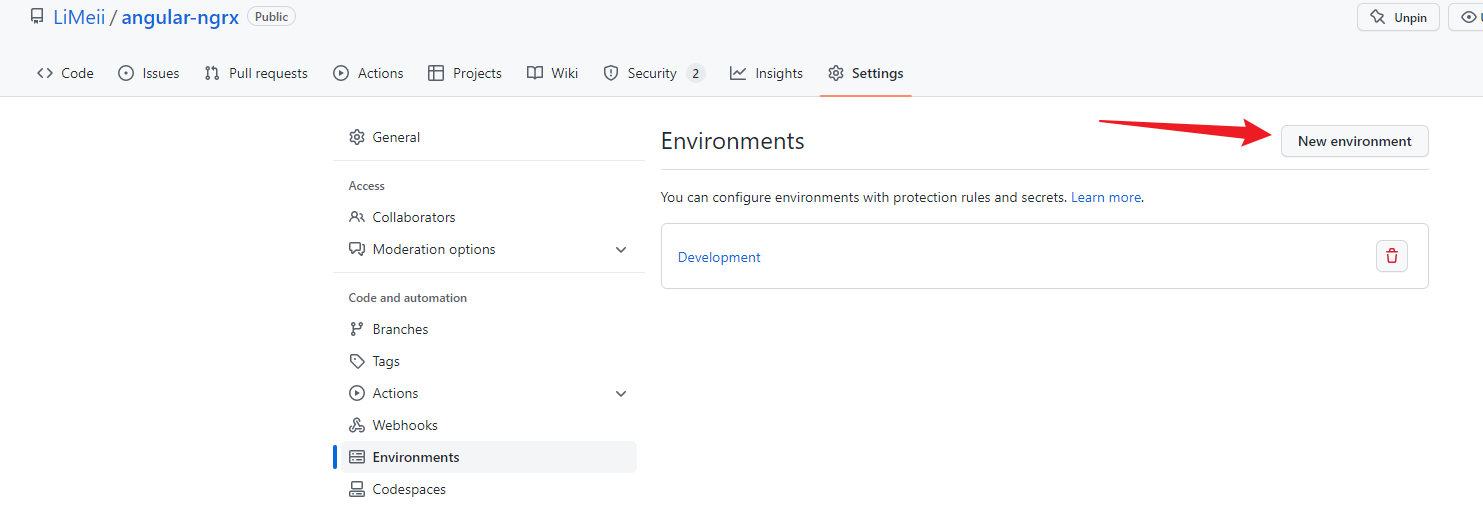
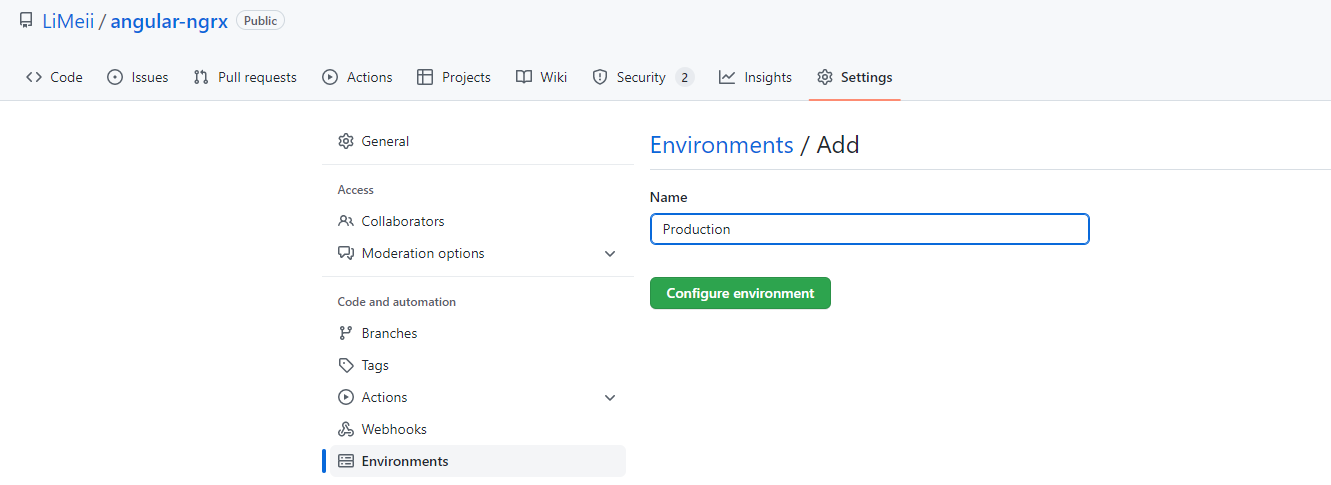
Add required reviewers and save protection rules:
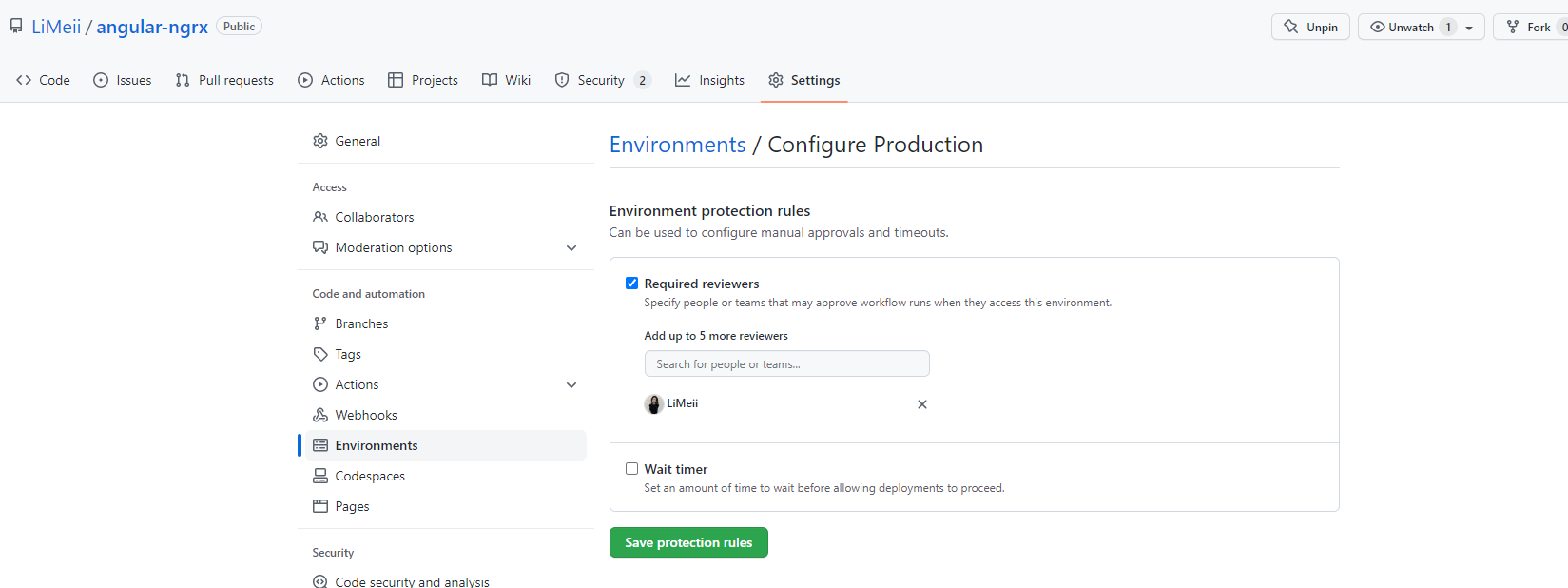
Manual triggr a workflow run and you will see Deploy to Production job pending on the approval from reviewers:
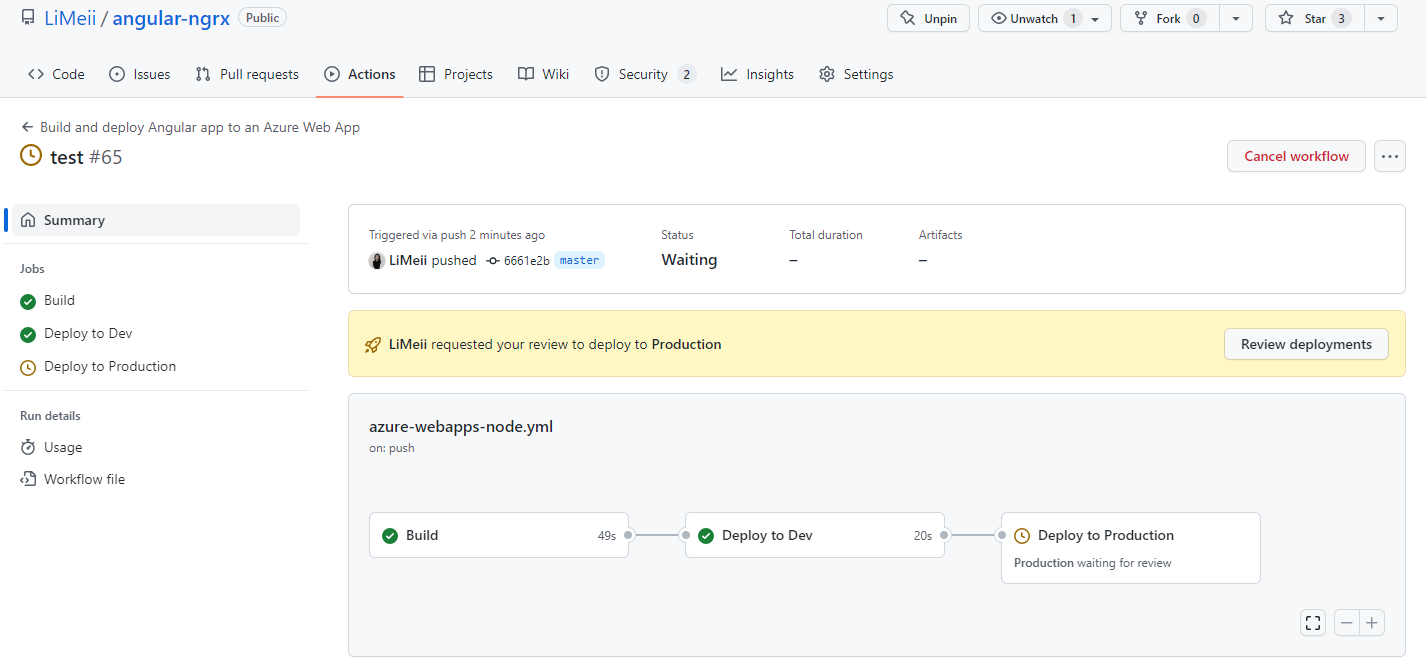
And the reviewers also will receive below notification email:
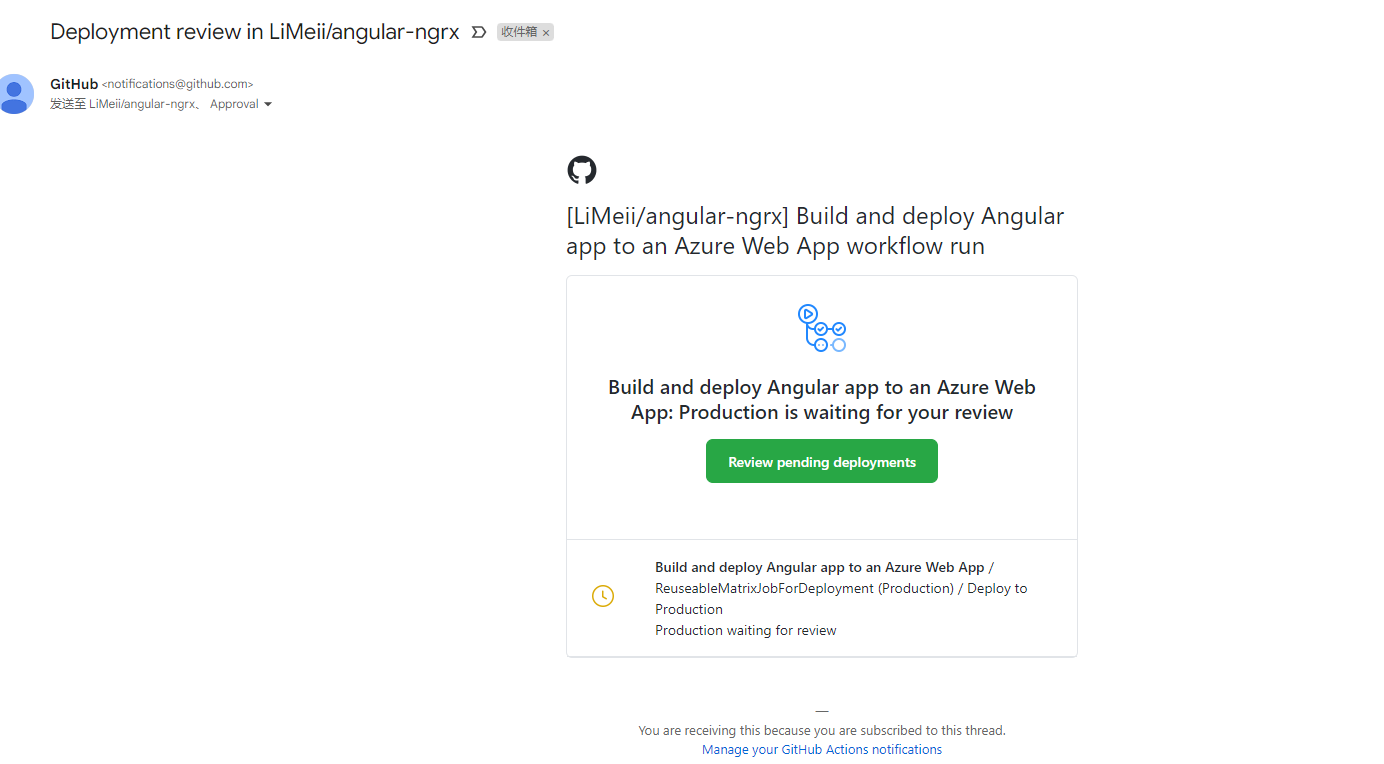
Reviewers click Approve and deploy will trigger the Production deployment
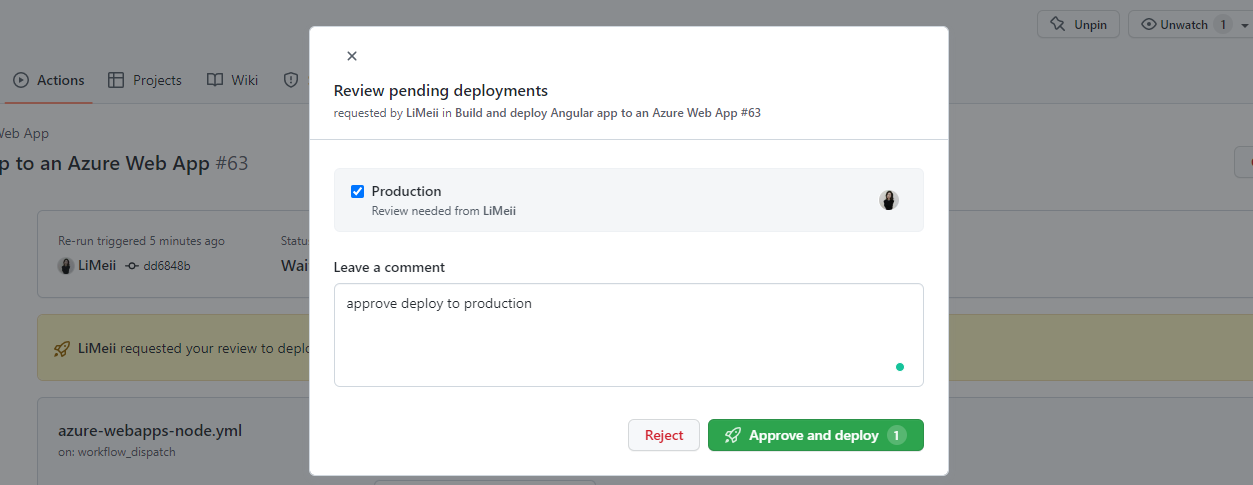
Reuse workflow
By fowllowing the steps above, you may notice, the deployment job is kind of duplicated, in this demo code, we only deploy to two environment. In real Projects, there may have 4 environemts, if follow above steps, all these 4 deployment job will be duplicated. From the best practice prespective, we need extract the duplicated deployment job into one invidual YML file, and reuse this deploy YML workflow.
We can use strategy to create a reuseable matrix job for deployment.
The first step is extract the deployment job to one invidual YML file:
Click here to see YML file 👇
name: Reusable deployment workflow
on:
workflow_call:
inputs:
target-env:
required: true
type: string
secrets:
AZURE_WEBAPP_SERVICE_NAME:
required: true
AZURE_WEBAPP_PUBLISH_PROFILE:
required: true
AZURE_WEBAPP_SERVICE_NAME_PROD:
required: true
AZURE_WEBAPP_PUBLISH_PROFILE_PROD:
required: true
jobs:
deploy:
name: Deploy to ${ { inputs.target-env } }
permissions:
contents: none
runs-on: ubuntu-latest
environment:
name: ${ { inputs.target-env } }
# url: $
steps:
- run: echo "🎉 target evn ${ { inputs.target-env} }"
- run: echo "🎉 target evn inputs.target-env"
- run: echo "💡 get azure webapp name from secrets ${ { secrets.AZURE_WEBAPP_SERVICE_NAME } }"
- run: echo "🍏 is Dev ${ { inputs.target-env } } == 'Development'"
- run: echo "🐧 is Prod ${ { inputs.target-env } } == 'Production'"
- name: Download artifact from build job
uses: actions/download-artifact@v3
with:
name: node-app
- name: unzip artifact for deployment
run: unzip release.zip
- name: "Deploy to Azure Dev WebApp"
if: inputs.target-env == 'Development'
id: deploy-to-webapp-dev
uses: azure/webapps-deploy@v2
with:
app-name: ${ { secrets.AZURE_WEBAPP_SERVICE_NAME } }
slot-name: "production"
publish-profile: ${ { secrets.AZURE_WEBAPP_PUBLISH_PROFILE } }
package: '.'
- name: "Deploy to Azure Prod WebApp"
if: inputs.target-env == 'Production'
id: deploy-to-webapp-prod
uses: azure/webapps-deploy@v2
with:
app-name: ${ { secrets.AZURE_WEBAPP_SERVICE_NAME_PROD } }
slot-name: "production"
publish-profile: ${ { secrets.AZURE_WEBAPP_PUBLISH_PROFILE_PROD } }
package: '.'
The second step is update previous YML file as:
Click here to see YML file 👇
name: Build and deploy Angular app to an Azure Web App
on:
push:
branches:
- master
workflow_dispatch:
inputs:
logLevel:
description: 'Log level'
required: true
default: 'warning'
type: choice
options:
- info
- warning
- debug
tags:
description: 'Test scenario tags'
required: false
type: boolean
environment:
description: 'Environment to run tests against'
type: environment
required: true
env:
AZURE_WEBAPP_NAME: my-app-name # set this to your application's name
AZURE_WEBAPP_PACKAGE_PATH: '.' # set this to the path to your web app project, defaults to the repository root
NODE_VERSION: '16.x' # set this to the node version to use
jobs:
build:
name: Build
runs-on: ubuntu-latest
steps:
- uses: actions/checkout@v3
- name: Use Node.js ${ { env.NODE_VERSION } }
uses: actions/setup-node@v3
with:
node-version: ${ { env.NODE_VERSION } }
cache: "npm"
cache-dependency-path: package-lock.json
- name: npm install, build, and test
run: |
npm install
npm run build --if-present
- name: Zip artifact for deployment
run: |
cd dist
zip release.zip ./* -r
- name: Upload artifact for deployment job
uses: actions/upload-artifact@v3
with:
name: node-app
path: ./dist/release.zip
ReuseableMatrixJobForDeployment:
needs: build
strategy:
fail-fast: true
matrix:
target: [Development, Production ]
uses: ./.github/workflows/deployment.yml
with:
target-env: ${ { matrix.target } }
secrets: inherit
Checkin above changes into master, and you can see the workflow run:
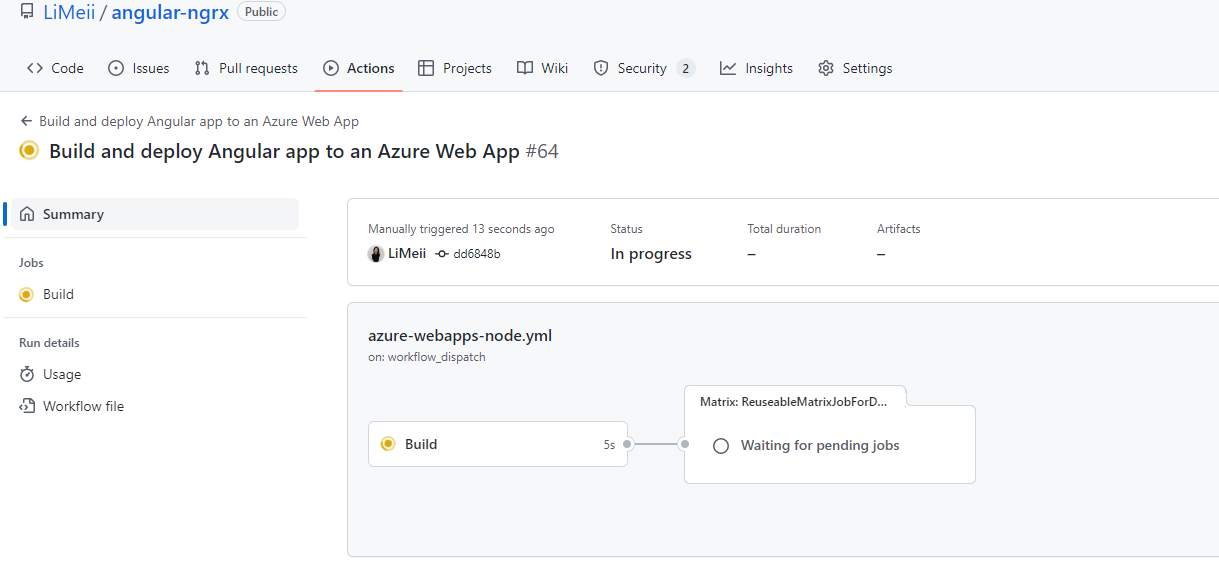
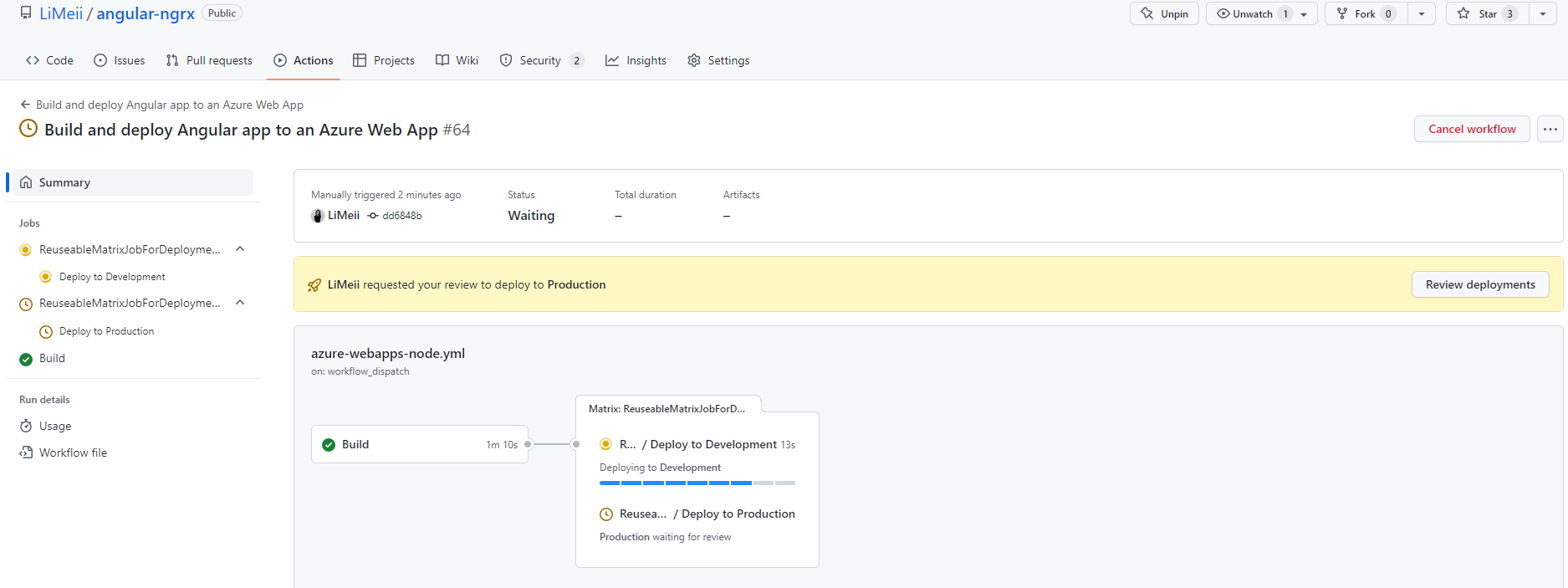
In development deploying job, the Deploy to Production job skipped:
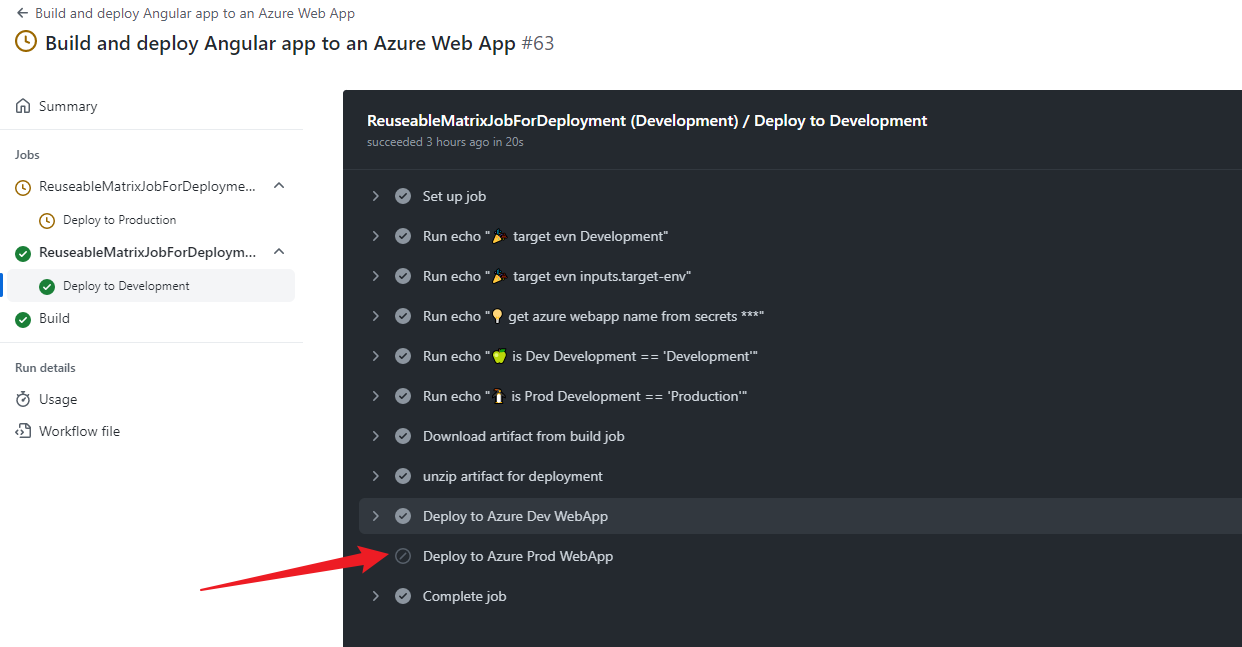
Deploy to Production job pending on reviewers’ approval:

Reviewer approve production deploying:
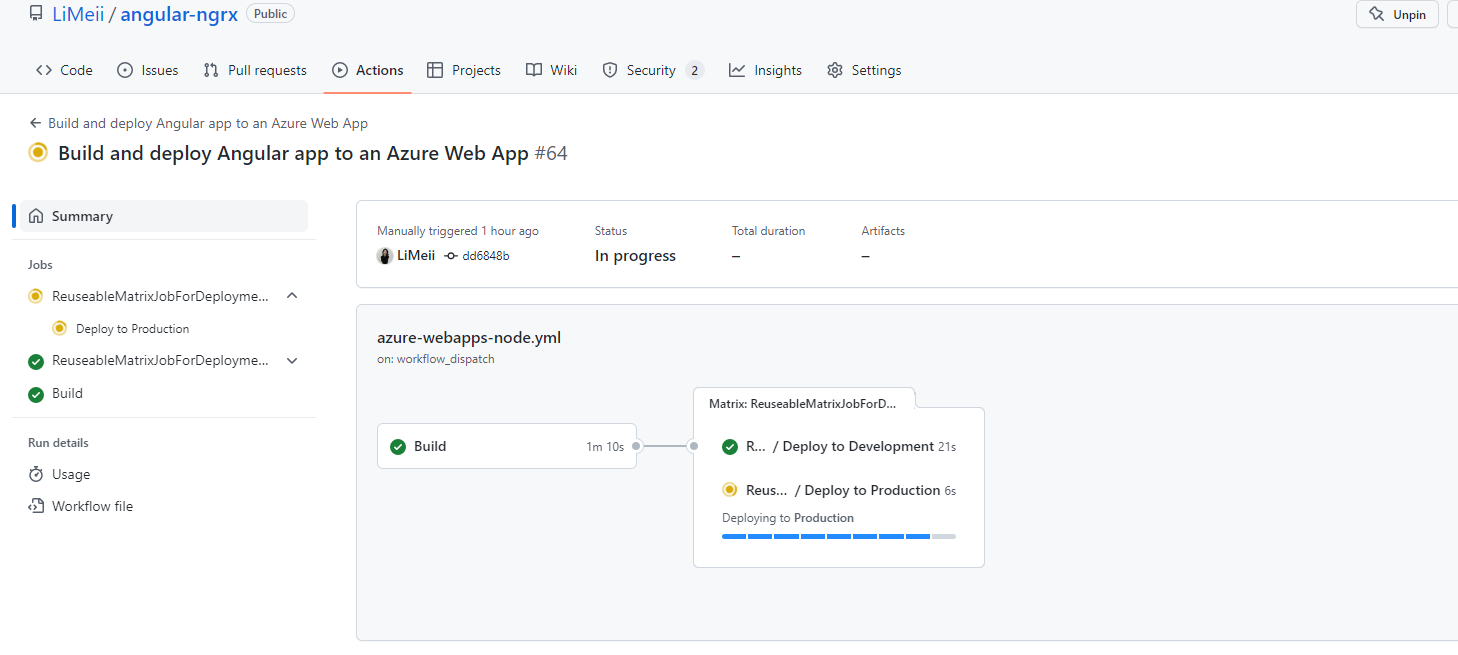
In production deploying job, the Deploy to Development job skipped:
